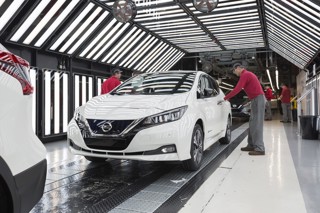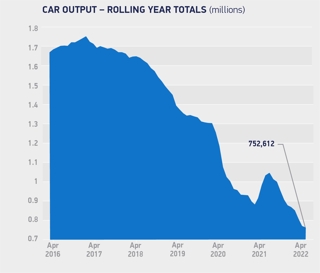Urgent action to address a 50% rise in energy bills is UK car manufacturers’ “number one ask” as the sector seeks help from Government, the Society of Motor Manufacturers and Traders (SMMT) has said.
According to the industry body the UK’s automotive manufacturing sector already spends £50m more for energy each year than its EU counterparts due to the highest electricity costs in Europe, warning that businesses will struggle to cope with an estimated £90m price hike in 2022.
Addressing the annual SMMT Summit in London yesterday (June 27), SMMT chief executive Mike Hawes called for five ‘asks’ to help manage the issue as he set out ‘From Full Throttle to Full Charge’, a new strategic roadmap setting out measures on energy, skills and funding to drive large-scale investment and support competitiveness.
Urgent action to address a 50% rise in energy bills is UK car manufacturers’ “number one ask” as the sector seeks help from Government, the Society of Motor Manufacturers and Traders (SMMT) has said.
According to the industry body the UK’s automotive manufacturing sector already spends £50m more for energy each year than its EU counterparts due to the highest electricity costs in Europe, warning that businesses will struggle to cope with an estimated £90m price hike in 2022.
Addressing the annual SMMT Summit in London yesterday (June 27), SMMT chief executive Mike Hawes called for five ‘asks’ to help manage the issue as he set out ‘From Full Throttle to Full Charge’, a new strategic roadmap setting out measures on energy, skills and funding to drive large-scale investment and support competitiveness.
“From COVID impacts to component shortages, supply chain disruption to trade uncertainty, and regulatory change to rising inflation, the challenges facing this sector are immense. Nevertheless, addressing the UK’s high energy costs is the industry’s number one ask,” Hawes said.
“Help with energy costs now will help keep us competitive and be a windfall for the sector, stimulating investment in innovation, R&D, training – all reinvested in the UK economy.
“With the right backing this sector can drive the transition to net zero, supporting jobs and growth across the UK and exports across the globe.”
An AM news insight feature found that car retailers may have to “turn off the showroom lights” in a bid to save cash as energy bills soar in 2022.
Darren Riva, the chief executive of Journey Energy Solutions, told car dealers that told that the only realistic way they can avoid rising energy costs in a potential crisis resulting from the war in Ukraine was to go “off grid”.
The SMMT’s plan calls for help tackling the issue, as OEM’s and suppliers transition to low-carbon technology. Hawes added: “Our plan, From Full Throttle to Full Charge, sets out how industry can work with government to build a UK automotive ecosystem fit for a zero-emission future.
“If there is the will, the effort and the action from government, they will find it matched by that of the UK industry in investment and competitiveness.”
From Full Throttle to Full Charge highlights the critical role automotive plays in every region of the UK, delivering well paid, highly skilled jobs, supporting communities and driving the wider economy.
More than a quarter (28.2%) of the automotive supply chain is based in the West Midlands alone, with 13.3% in Yorkshire and Humber and 11.8% in the North West.
With the right conditions the industry has a unique potential to be a driver of new jobs, growth and decarbonisation, the SMMT said.
From Full Throttle to Full Charge’s five crucial UK Automotive asks are:
- Support businesses facing high energy costs as they transition to net zero, including the provision of short-term support; making UK automotive equivalent to Energy Intensive Industry status; maintaining automotive Climate Change Agreements; and delivering low cost, zero carbon electricity and a national supply of hydrogen.
- Deliver a globally competitive business environment for the sector, by expanding the scale and scope of the Automotive Transformation Fund to boost supply chain transformation and adaptation.
- Create a globally competitive investment environment, extending the super deduction or introducing a generous successor, and enhancing R&D tax credits.
- Ensure full implementation of the EU-UK Trade and Co-operation Agreement and prioritise UK automotive in trade policy and future free trade agreements.
- Focus on current and future skills needs via reform to the Apprenticeship Levy and a dedicated long term automotive skills strategy.
Attempting to communicate the urgent need for changes to support the automotive manufacturing sector as it transitions to zero-emissions transport, the SMMT said “the timeframe to act is narrowing”.
It also highlighted the need for domestic production ahead of the 2024 toughening of EU-UK Rules of Origin.
“At stake in the transition are the 123,500 jobs supported in every region of the UK, across some 5,000 firms, which turnover a collective £21.2bn every year, export products worth £7bn and deliver £5.7bn direct to the economy”, it said.
Login to continue reading
Or register with AM-online to keep up to date with the latest UK automotive retail industry news and insight.



















Login to comment
Comments
No comments have been made yet.